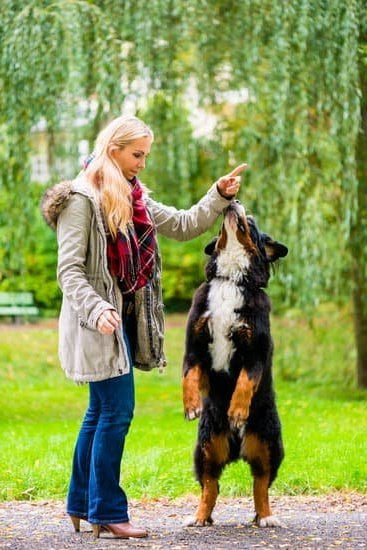Are you wondering how to train a pitbull as a service dog? Pitbulls are strong, intelligent, and loyal dogs that have the potential to excel as service animals. In this article, we will explore the process of training a pitbull to become a reliable and effective service dog. From understanding the role of service dogs to legal considerations and rights for pitbull service dog owners, we will cover everything you need to know to embark on this rewarding journey.
Service dogs play a crucial role in providing support and assistance to individuals with disabilities. From guiding the visually impaired to alerting individuals with medical conditions, these highly trained animals offer invaluable aid in various tasks. While many people may not immediately think of pitbulls as service dogs, their unique qualities make them well-suited for this important role.
The journey of training a pitbull as a service dog begins with understanding the temperament and suitability of the breed for this type of work. It is essential to assess the individual characteristics and behavior of each pitbull to determine their potential for success in service dog training.
Additionally, obedience training, socialization techniques, task training, public access training, and legal considerations all play vital roles in preparing a pitbull for their duties as a service dog. So let’s delve into each aspect and uncover the benefits and rewards of training a pitbull as a service dog.
The Benefits of Training a Pitbull as a Service Dog
Training a pitbull to become a service dog can have numerous benefits, both for the dog and the individual in need of assistance. Service dogs are highly trained to perform specific tasks that help people with disabilities lead more independent lives. When it comes to pitbulls, their natural intelligence, loyalty, and strong work ethic make them excellent candidates for service dog training.
Companionship and Support
One of the greatest benefits of training a pitbull as a service dog is the companionship and emotional support they provide to their owners. Pitbulls are known for their loving and affectionate nature, making them perfect for offering comfort and encouragement to individuals with physical or emotional challenges. Their unwavering loyalty also helps create a strong bond between the dog and their owner, providing a sense of security and reassurance.
Physical Assistance
Pitbulls can be trained to assist individuals with physical disabilities by performing tasks such as retrieving items, opening doors, or providing stability while walking. With proper training, these intelligent dogs can learn to respond to specific commands that cater to the unique needs of their human companion. This type of physical assistance significantly increases the independence and quality of life for individuals facing mobility issues.
Increasing Awareness and Acceptance
By training pitbulls as service dogs, it also helps increase awareness and acceptance of the breed. Unfortunately, pitbulls are often misunderstood and face discrimination due to negative stereotypes. However, showcasing their abilities as skilled service animals helps challenge these misconceptions and promotes positive representation of pitbulls in society. This can lead to greater acceptance and inclusion of pitbulls in various roles, including service dog duties.
Overall, training a pitbull as a service dog not only provides valuable assistance to individuals in need but also highlights the remarkable qualities of this breed when given appropriate training and guidance on how to train a pitbull as a service dog.
Assessing the Pitbull’s Temperament and Suitability for Service Dog Training
Temperament Evaluation
Before beginning the training process, it is crucial to assess the pitbull’s temperament to determine if it is suitable for service dog training. Service dogs must possess traits such as calmness, confidence, and a strong willingness to please. It is important to observe how the pitbull responds to various stimuli, including other animals, loud noises, and unfamiliar environments. A generally well-behaved and obedient pitbull may be a good candidate for service dog training.
Professional Guidance
In some cases, seeking the expertise of professional trainers or behaviorists can help in evaluating the pitbull’s temperament. These individuals can provide insight into the dog’s potential as a service dog based on their experience and knowledge of canine behavior. They can also offer advice on techniques to address any specific behavioral issues that may affect the pitbull’s suitability for service dog training.
Suitability for Specific Tasks
Beyond general temperament evaluation, it is important to consider the specific tasks that a pitbull will be trained to perform as a service dog. Some tasks may require physical strength or agility, while others may necessitate a high level of focus and attentiveness. Evaluating the pitbull’s inherent strengths and weaknesses can help determine its suitability for certain service dog duties.
Training a Pitbull as a Service Dog: Conclusion
After assessing the pitbull’s temperament and suitability for service dog training, it becomes evident that this breed has great potential for fulfilling such roles. With proper evaluation and guidance from professionals, pitbulls can excel in providing assistance to individuals with disabilities or special needs. Moving forward with obedience training and task-specific instruction tailored to their abilities, these remarkable dogs can become valuable companions and helpers in various contexts.
Obedience Training Essentials for Pitbulls
When it comes to training a pitbull as a service dog, obedience training is essential to ensure that the dog can perform its duties reliably and safely. Here are some key obedience training essentials for pitbulls:
1. Establishing basic commands: Start with teaching your pitbull basic commands such as sit, stay, come, and heel. These commands form the foundation for more advanced training and are crucial for a service dog to follow instructions in various situations.
2. Positive reinforcement: Pitbulls respond well to positive reinforcement techniques such as praise, treats, and toys. When they exhibit the desired behavior, be sure to reward them immediately to reinforce their good behavior.
3. Consistency and patience: Obedience training takes time and patience, especially with pitbulls who can be strong-willed. Consistent training sessions and a patient approach will yield better results in the long run.
Additionally, it is important to remember that each pitbull is an individual with its own unique personality and learning style. Some may take longer to grasp certain commands or behaviors than others. Understanding your pitbull’s temperament and adjusting your training methods accordingly is crucial for success in obedience training.
By focusing on these obedience training essentials, you can effectively prepare your pitbull for the more specialized tasks required of a service dog.
Socialization and Desensitization Techniques Specific to Pitbulls
Pitbulls are a strong and powerful breed known for their loyalty and intelligence. However, they also have a reputation for being aggressive, which can make the socialization and desensitization process crucial when training them as service dogs. It is important to expose pitbulls to a wide variety of people, animals, and environments from an early age to ensure they are well-adjusted and confident in different situations.
One effective method for socializing pitbulls is through positive reinforcement training. This involves rewarding the dog with treats, toys, or praise when they display calm and friendly behavior around new people and animals. It is essential to start this process as soon as possible and continue it consistently throughout the dog’s life.
Additionally, desensitization techniques can help pitbulls become more comfortable in situations that may trigger anxiety or fear. This can include gradually exposing the dog to different sounds, sights, and experiences in a controlled and positive way. For example, if a pitbull shows fear towards loud noises, such as thunderstorms or fireworks, gradual exposure to these sounds at a low volume while providing treats or play can help them overcome their fear.
Overall, socialization and desensitization are critical components of training a pitbull as a service dog. By following these techniques with patience and consistency, owners can help their pitbull develop into confident and well-adjusted companions ready for the responsibilities of serving as a service dog.
| Socialization Techniques for Pitbulls | Desensitization Techniques for Pitbulls |
|---|---|
| Positive reinforcement training | Gradual exposure to triggers |
| Early exposure to different people and animals | Creating positive associations with triggers through rewards |
| Consistent social interaction throughout the dog’s life | Patience and gradual exposure to build confidence |
Task Training for Service Dog Duties
Training a pitbull as a service dog requires specific task training to prepare them for assisting their handler in various ways. Here are some essential tasks that a pitbull can be trained to perform as a service dog:
- Alerting to medical conditions: Pitbulls can be trained to alert their handler to oncoming seizures, drops in blood sugar levels, or other medical emergencies. This may involve pawing at the handler, barking, or other distinct behaviors.
- Retrieving items: Service pitbulls can be taught to retrieve items such as medication, a phone, or other necessary objects for their handler when needed.
- Assistance with mobility: Pitbulls can be trained to provide physical support and stability for individuals with mobility impairments. This may include bracing the handler or providing assistance with balance while walking.
In addition to these tasks, it is important to consider the individual needs of the handler and tailor the training accordingly. Some pitbulls may also be trained for specific tasks related to psychiatric service dog duties, such as grounding techniques or interrupting harmful behaviors.
It is crucial to work with a professional trainer who has experience in training service dogs, particularly pitbulls. They can provide guidance on how best to train these specific tasks and ensure that the pitbull is properly prepared for their role as a service dog. With the right approach and dedication, pitbulls can excel in their duties as service dogs and provide invaluable assistance to their handlers.
Public Access Training for Pitbull Service Dogs
Public access training is a crucial part of the process when training a pitbull as a service dog. This type of training focuses on teaching the pitbull how to behave in various public settings while assisting its handler.
It is important to note that in the United States, the Americans with Disabilities Act (ADA) protects the rights of individuals with disabilities to be accompanied by their service animals in public places. This means that it is essential for pitbull service dogs to undergo proper public access training to ensure they can accompany their handlers in any environment.
During public access training, pitbull service dogs are taught to remain calm and well-behaved in different situations such as crowded areas, loud noises, and various distractions. They also need to learn how to navigate through tight spaces and stay focused on their handler while ignoring external stimuli. This type of training requires patience, consistency, and positive reinforcement techniques.
As with other aspects of service dog training, it is recommended that public access training for pitbulls be conducted under the guidance of professional trainers who have experience working with this breed. Handler education is also essential, as they need to understand their rights and responsibilities when accompanied by a service animal in public places.
| Aspect | Description |
|---|---|
| Training Environment | Public places such as parks, shopping malls, restaurants |
| Focus Areas | Calm behavior, navigating through crowds, ignoring distractions |
| Professional Involvement | Recommendation for professional trainers experienced with pitbulls |
Legal Considerations and Rights for Pitbull Service Dog Owners
When training a pitbull to become a service dog, it is important to consider the legal aspects and rights that come with owning and using a service dog. In many places, including the United States, service dogs are protected under the Americans with Disabilities Act (ADA). This means that individuals with disabilities are allowed to have their service dogs with them in public places such as restaurants, hotels, and on public transportation.
It is crucial for pitbull service dog owners to be aware of their rights and the legal protections afforded to them under the ADA. These rights include being allowed access to all public areas alongside their service dog, regardless of any breed-specific legislation in their area.
However, it is important for owners to understand that they may be asked two specific questions regarding the nature of their disability and what task or work the dog has been trained to perform. It is important for owners to be prepared to answer these questions when necessary.
Additionally, as a pitbull owner training a service dog, it’s important to understand that there may be additional regulations or restrictions specific to pitbulls in certain areas. It is essential to conduct thorough research on local laws and regulations related to ownership of pitbulls and service dogs. Understanding these legal considerations will help owners navigate potential challenges while training and owning a pitbull as a service dog.
Pitbull service dog owners should also familiarize themselves with the process for obtaining certification for their service dog. While ADA does not require certification for service animals, it can still be beneficial in certain situations such as travel or housing accommodations. Organizations like the Canine Good Citizen (CGC) program offer certifications specifically designed for therapy dogs and assistance dogs, which can provide additional credibility and ease when accessing certain facilities or services.
Resources and Support for Pitbull Service Dog Training and Certification
Training a pitbull as a service dog can be a challenging yet rewarding endeavor. It is important to have access to the resources and support needed to effectively train and certify your pitbull for service dog duties. There are various organizations and professionals that specialize in service dog training, specifically for pitbulls, that can provide valuable guidance and assistance throughout the training process.
One resource for pitbull service dog training is working with a certified professional dog trainer who has experience in training service dogs. These trainers can provide personalized guidance and support tailored to the specific needs and temperament of your pitbull. Additionally, enrolling in a reputable service dog training program or organization can offer structured training curriculum, resources, and expertise in training pitbulls for service work.
In addition to professional assistance, seeking support from other pitbull service dog owners or organizations can also be beneficial. Connecting with individuals who have successfully trained their pitbulls as service dogs can provide valuable insight, tips, and encouragement. There are online communities, forums, and support groups dedicated to owners who are training their pitbulls as service dogs, where experiences and advice can be shared.
Furthermore, accessing reliable information about the certification process for pitbull service dogs is essential. Understanding the legal requirements and rights associated with owning a certified service dog is crucial for ensuring a smooth transition into public access work. By utilizing these resources and support systems, individuals looking to train a pitbull as a service dog can increase their chances of success and ensure the well-being of their canine partner throughout the process.
Conclusion
In conclusion, training a pitbull as a service dog can be an incredibly rewarding experience for both the owner and the dog. These loyal and intelligent animals have the potential to excel in their duties and provide life-changing assistance to those in need. By properly assessing their temperament, providing essential obedience training, and implementing specific socialization techniques, pitbulls can become reliable service dogs that enhance the lives of their owners.
The benefits of training a pitbull as a service dog are numerous. Not only do these dogs have the capacity to perform important tasks and provide support to individuals with disabilities, but they also serve as ambassadors for their breed. By showcasing the positive traits of pitbulls through their work as service dogs, they help challenge negative stereotypes and misconceptions about this often misunderstood breed.
For those considering how to train a pitbull as a service dog, it is important to remember that patience, dedication, and professional guidance are essential. Whether it’s obedience training, task-specific training, or public access training, seeking out resources and support from experienced professionals will ensure that both the dog and its owner are fully prepared for the responsibilities that come with having a service animal.
Ultimately, the rewards of training a pitbull as a service dog extend far beyond personal fulfillment – they contribute positively to society as a whole by promoting empathy, understanding, and inclusivity.

Welcome to the blog! I am a professional dog trainer and have been working with dogs for many years. In this blog, I will be discussing various topics related to dog training, including tips, tricks, and advice. I hope you find this information helpful and informative. Thanks for reading!





